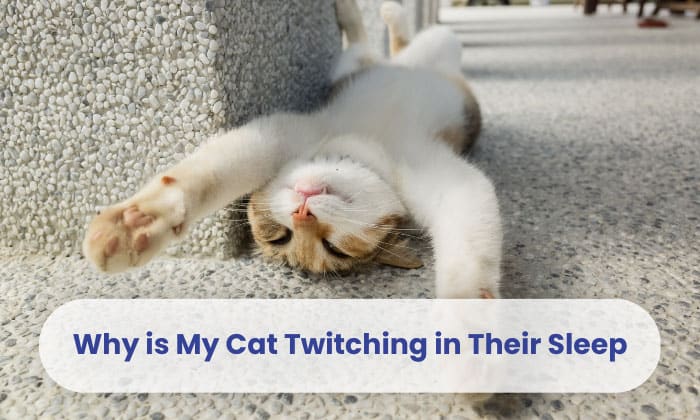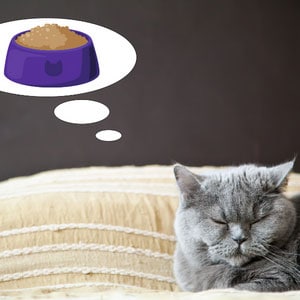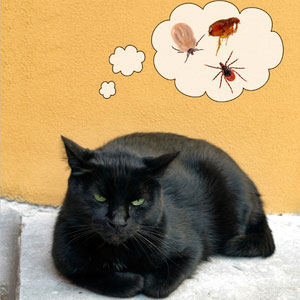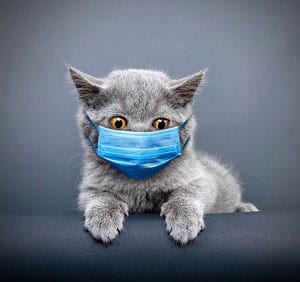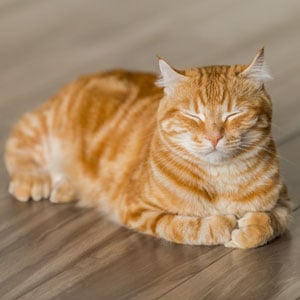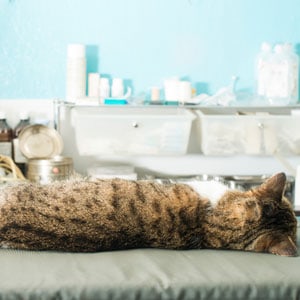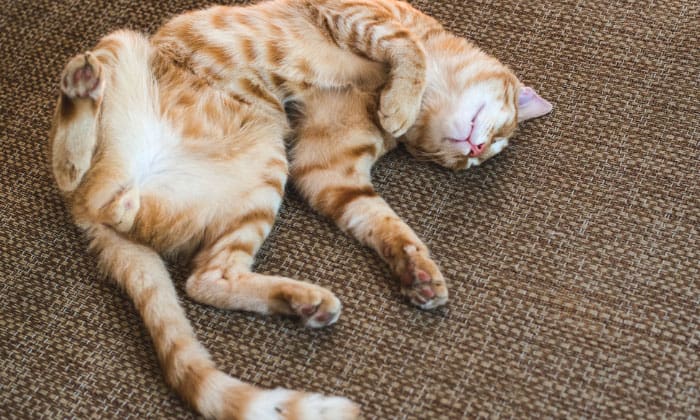I’ve seen my cats pedaling in their sleep as if they are chasing someone. It left me wondering: why is my cat twitching in their sleep?
A cat twitching during sleep is dreaming. Compared to humans, they undergo REM sleep in 25-minute intervals instead of 90 minutes. So, despite the short nap, their brains are active.
This article talks about the causes of twitching and shaking, the solutions, as well as your cats’ deep sleep stages.
Table of Contents
5 Causes of Cats Shaking in Sleep
1. Dreaming
The REM or Rapid Eye Movement in your cats begins within 25 minutes of sleeping then the brain starts to become active.
So, if you see your cats twitching while asleep, it’s because they are dreaming of running to hunt their prey or thinking of the delicious meal you’ll serve them for dinner.
Kittens having nightmares can also twitch in sleep. For that matter, rest assured that twitching during sleep is normal.
However, there may be other reasons that can be a subject of concern. Check out the different causes I’ll share with you below.
2. Mites or Fleas Infestation
Kittens twitching in sleep is fascinating. It makes you watch them sleep, thinking that they are dreaming something great. But is that really it?
If your cats or kittens have excessive twitching between catnaps, then it could mean a different thing–ear mites or fleas.
When your cat feels itchy in their rear area, it could mean they’re being infested with fleas. On the other hand, twitching ears could mean ear mites infestation. Don’t wait until these parasites get overwhelming.
- What Should You Do?
You can go to the nearest vet clinic immediately for the correct medication. Taking medicine for fleas and ear mites may be faster than most home remedies. If this occurs, blood tests are crucial to ensure no infection or anemia caused by the infestation.
The best thing to do is to bathe your cats regularly. Use soap recommended by the vet or something with an anti-ticks or anti-fleas formula.
You can also ask your pet’s doctor about flea-control products. By doing these steps, you can ensure a healthy and parasite-free furbaby.
3. Allergies
As mentioned above, fleas and ear mites cause itching and twitching. The same happens with allergies. So, if your cats have skin infections or allergies, these could result in twitching and scratching.
- What Should You Do?
Kitten twitches in sleep may have allergies, immediately check with your veterinarian. They may advise you on different ways to relieve and reduce them.
The fundamental way to alleviate mild allergies is through hypo-allergenic products. So, if you’ve been using soap or shampoo that triggers a skin rash in your cats, you have to change it immediately.
You can also ask your vet doctor about the best product for your furbaby. If you do this step, but the allergy persists, then the vet may recommend anti-inflammatory therapy.
Here are some professional advice:
- Have flea medication regularly to prevent flea allergies.
- Clean their paws before and after going outdoors.
- Bathe your cats with hypo-allergenic products regularly.
- Maintain their ear cleanliness.
4. Seizures
“Is my cat twitching in sleep or seizure?” This is one of the common questions asked by fur parents who look at their cats twitching in their sleep. Is this something that also bothers you?
A seizure is different from having a normal or occurring twitching when dreaming. A cat who experiences this symptom shows other signs like rigid cat’s limbs, convulsion, and salivation. If you suspect your cat has a seizure, contact your vet doctor right away.
Here are some of the few trigger factors of seizures that your cats must avoid:
- Extreme stress
- Extreme pain
- Hypoglycemia
- Low body temperature
- High body temperature
Take note that seizures might be another symptom of underlying health issues. So, it would be best to follow the safety procedures.
5. Feline Hyperesthesia Syndrome
Feline Hyperesthesia is an occurring syndrome that needs further research. Other vets and researchers relate it to a mental condition, while others claim it is a seizure condition.
Nonetheless, twitching is one of the symptoms found in FHS. Other symptoms include:
- Sudden heavy breathing
- Obsessive licking
- Excessive tail-flicking
- Seizures
- Zoomies
- Salivation
- Dilated pupils
If you see these symptoms aside from twitching, contact your cat’s veterinary doctor immediately, as this can be a severe problem.
According to the research, cats with FHS reveal symptoms randomly, depending on the trigger factors.
The trigger factors could be:
- Random visitors
- Change in diet
- Change in litter sand
- Knocking
- Noise
- Doorbells
- Too much petting
By knowing these factors, you’ll learn how to address the issue to prevent seizures from happening.
- What Should You Do?
You must contact the vet to diagnose your cat shakes when sleeping. So, if it turns positive (I hope not), the doctor gives medication to subside the symptoms.
Yes, you’ve heard it right. Vet doctors can only give medication for the symptom, and not the syndrome itself. More researchers are conducting more studies about this matter to find the best solution for cats with FHS.
The harsh truth is that it doesn’t have any cure yet—no pills or potions. But the good news is you can alleviate the symptoms.
Other vets recommend medications for seizures and inflammations. Nonetheless, ensure to talk with the doctor intently to know the possible side effects of taking the medicines.
When Does the Dream Happen?
Cat dreams happen at any time during their sleeping stage. However, the most vivid dream occurs during the REM phase of deep sleep.
Humans need a 90-minute phase to reach the peak of sleep, whereas cats only need 25 minutes to reach this stage.
During the REM stage, the cats’ brains are active. This is where you will see them twitching, pedaling, squeaking, or moving their paws like they’re looking for something.
The deep sleep phase lasts only 10 minutes, but another phase appears—the activated sleep. At this stage, cats still dream, but less vivid ones.
Despite that, you will still catch them twitching or moving. At this point, their nervous system becomes more active. So, no matter how cute they look, don’t try to wake them up as this is the stage they try to recover and make their nervous system healthier.
What Do Cats Dream About?
Sometimes, I’m thinking what it feels like to enter my cat’s minds and explore their deepest thoughts and emotions in their fantasy world
Cats dream about different things, and like humans, the details are related to the usual activities in their everyday lives. So, if they love hunting rats, there’s a big possibility of dreaming about it in their sleep.
On other days, cats have nightmares too. But never wake up a deep-sleeping cat as it can hurt you unintentionally. Just try to stay with them and give more kisses and cuddles when they wake up.
What Are Cats Sleep Stages
There are four stages of cats’ sleep stages. But let us focus on the two most important: REM sleep and deep sleep.
- REM sleep is the 25-minute phase where vivid dreams occur. At this point, twitching and cats’ body movements are more visible.
- Deep sleep, on the other hand, is the phase of sleep where the body system repairs itself to help your cats recover and regain their energy.
Should I Wake My Cat Up When Twitching?
No, twitching is normal for cats when dreaming in sleep. Sleep is an important part of cats’ daily lives. And if you try to disrupt their sleep, they might react negatively and hurt you.
Instinctively, cats need to sleep to reserve their energy and use it for hunting. They are also regaining their energy and helping themselves fully recover, especially if they are unfeeling well for a moment.
Conclusion
Cats are adorable when sleeping, it’s like you want to cuddle and hold them dearly. However, the question ‘Why is my cat twitching in their sleep’ is not a new question from a cat parent like you. It means you care a lot.
Good thing, cats’ dreaming and twitching is a natural phenomenon that happens since the beginning of their existence.
Unless you see other underlying symptoms aside from twitching in sleep, you have nothing to worry about. Your cats are just having nice hunting moments in their own mysterious world.

I am Amy Sawy, a Doctor of Veterinary Medicine (DVM) graduate from the University of Kansas. y husband, Dr. Plummer, and I own a veterinary clinic in Phillipsburg, Kansas. In addition to my professional background, I am a devoted pet owner myself, with a household that includes dogs, rodents, and most notably, cats – a total of five felines in my home.
In 2020, I joined an organization as a professional writer, leveraging my experience and collaborating with my team to deliver the most valuable information for your cat’s care.


